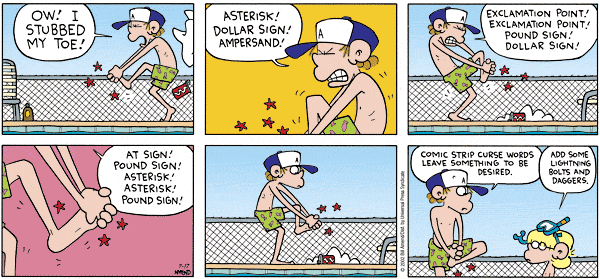July 17, 2005
You taught me language, and my profit on't / Is, I know how to curse
Today's Foxtrot questions the role of linguistic content in cussing:
I sympathize. Shortly after reading the Sunday funnies this morning, I totally smashed my toe on a suitcase left in an inappropriate place. But why does saying certain words, with or without lightening bolts and daggers, seem to help in this situation? As far as I can tell, though there are many theories about this, the answer is still not clear. [See e.g. Timothy Jay's "Why We Curse. A Neuro-Psycho-Social Theory of Speech" (1999) , and its review by Howard Kushner, Journal of Nervous & Mental Disease, 189(4):269-270, April 2001].
As I nursed my sore toe, a different question occurred to me. Is cursing a cultural universal? Perhaps there's a good review of this question somewhere, though a bit of searching in Google Scholar and other places didn't turn up an answer. As I thought about it, though, I realized that this is a very difficult question to frame in an empirically useful way. In simpler language, how would you tell?
There are many circumstances that we think of as "cursing and swearing", and they seem to be connected at best by a sort of family resemblance: expressing pain, anger, frustration, annoyance; insulting someone, directly or descriptively; invoking or wishing for supernatural assistance in harming someone; adding emphasis to statements whether positive or negative in content; using certain taboo words, or referring to certain concepts in any way at all; issuing ritual guarantees of truthfulness, perhaps by exposing oneself to supernatural punishment for falsehood; and so on.
In any one of these areas, there are expressions that are not "curse words" (e.g. "ouch" or "oh oh oh") as well as those that are (e.g. the phrases that Bill Amend represented in the Foxtrot strip as "Asterisk! Dollar Sign! Ampersand!"). We think we know the difference, but sometimes kids get it wrong (or at least learn a different categorization), and expressions famously change category over time.
The linguistic details also differ markedly across cultures, even among Europeans. According to Boele De Raad et al., "Personality terms of abuse in three cultures: type nouns between description and insult", European Journal of Personality 19(2), 153-165 (2004), who asked "one hundred and ninety-two male subjects from Spain, Germany and the Netherlands ... to write down terms of abuse that they would use given a certain stimulus situation",
[i]n Spanish abusive language is typically about family and relations, in Germany it is typically about anal aspects, and in the Netherlands it is mainly about genitals.
I'm sure that people in every culture insult one another. But is there a counterpart in every culture to "abusive language"? Is the "abusive language" of insults always analogous to (and sharing expressions with) the "curse words" that express pain or frustration? What about ways to indicate emphasis?
This seems to me to be analogous to a set of problems in philosophy of mind:
Do octopuses wince and groan when in pain? Scream and yell? How similar is octopuses' escape behavior, from the purely physical point of view, to the escape behavior of, say, middle-aged, middle-class American males? Is there an abstract enough nonmental description of pain behavior that is appropriate for humans and octopuses and all other pain-capable organisms and systems? [Jaegwon Kim, "Philosophy of Mind", Westview Press, 1996, p. 96]
However, I'm not aware of any similar philosophical investigation of the cross-cultural interpretation of cursing.
[Here are some other interesting links, which unfortunately don't address the question of universality:
Geoffrey Hughes, "Swearing: A Social History of Foul Language, Oaths and Profanity in English", Blackwell, 1991.
Timothy Jay, "Cursing in America: A Psycholinguistic Study of Dirty Language in the Courts, in the Movies, in the Schoolyards and on the Streets". John Benjamins, 1992.
Howard I. Kushner. "A Cursing Brain? The Histories of Tourette Syndrome". Harvard University Press, 1999.
Kate E. Brown and Howard I. Kushner, "Eruptive Voices: Coprolalia, Malediction, and the Poetics of Cursing", New Literary History 32.3 (2001) 537-562.
Kushner's "Cursing Brain" book raises a medico-anthropological question for me. Presumably every culture has sufferers from the condition sometimes called "Tourette's syndrome", apparently caused by hypersensitivity of dopanergic receptors in the basal ganglia, in (some variants of ) which there are compulsive taboo verbal outbursts of various sorts. The details of these verbal tics are obviously language-specific -- the famous Marquise de Dampierre repeatedly burst out with "merde et foutu cochon", not "shit and fucking pig", because she was a 19th-century French aristocrat, not an English one. The details are also apparently (often?) context specific: the description by Jean Marc Gaspard Itard of Madame de Dampierre's case (Archives Générales de Médecine, 1825) explained that
In the midst of a conversation that interests her extremely, all of a sudden, without being able to prevent it, she interrupts what she is saying or what she is listening to with bizarre shouts and with words that are even more extraordinary and which make a deplorable contrast with her intellect and her distinguished manners. These words are for the most part gross swear words and obscene epithets and, something that is no less embarrassing for her than for the listeners, an extremely crude expression of a judgement or of an unfavorable opinion of someone in the group.
So examining the behavior of such cases across cultures should give some indication of what counts locally as "gross swear words and obscene epithets". However, some of these Tourette's outbursts are apparently just insulting or embarrassing, without involving what we would call "curse words" or violating other specifically linguistic taboos.
]
Posted by Mark Liberman at July 17, 2005 12:49 PM